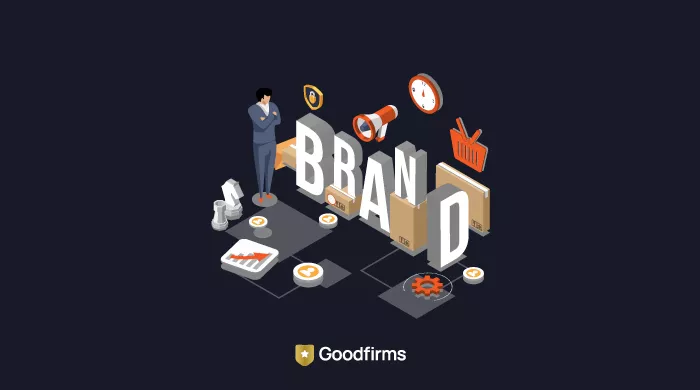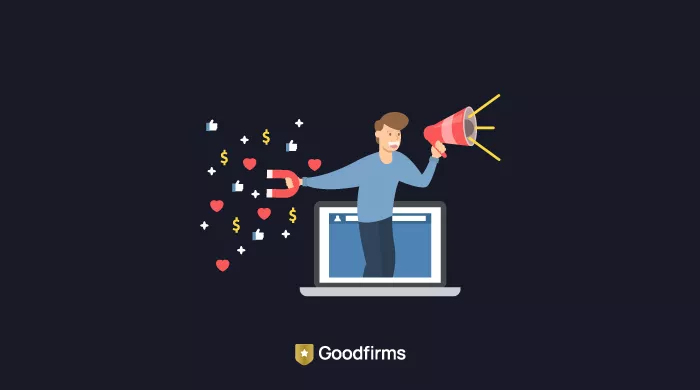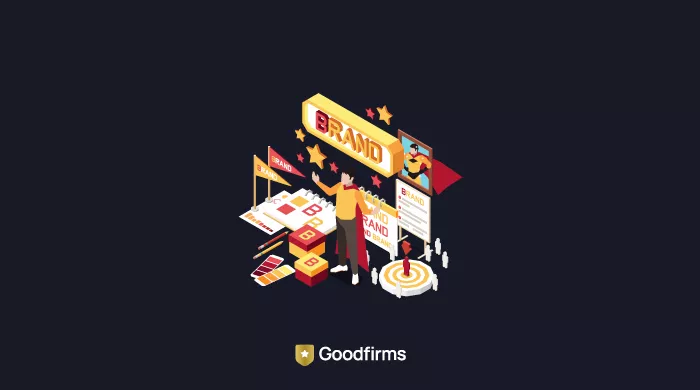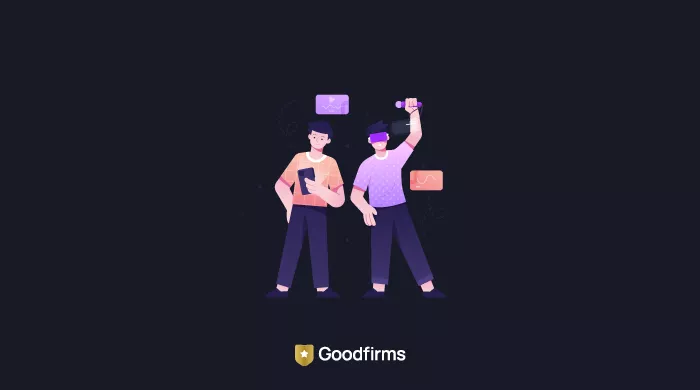In 2019, we experienced a major shift online.
We found that less than half of all Google searches resulted in users clicking through to websites listed on SERPs (search engine results pages). This was largely due to the incorporation of structured data-powered rich results.
Today, users are finding answers to their queries instantly, without ever having to leave Google. “Zero-click searches” have reached an all-time high, now claiming the majority of browser-based searches on Google.
So what does this mean for our websites? How can we produce content that still gets clicks on the world’s leading search engine while also taking advantage of zero-click opportunities? How can we continue competing organically when Google-owned content is stealing more SERP real estate than ever before?
We need to realign our SEO strategies and general marketing efforts so we can continue showing up at the top of Google search results. Doing so will allow us to continue building our businesses online successfully.
We’re excited to share our top strategies for winning over zero-click searches, but first, let’s start by clarifying what we mean when we use this term.
What are Zero-Click Searches?
A zero-click search is when a user enters a query on Google, and the answer appears right on the SERP. If the user is satisfied, they don’t need to click on another website for more information.
The bad news is, with over half of all searches resulting in instant, zero-click answers, organic traffic is decreasing for many websites. The good news is people are still clicking on websites when they need thorough answers to more complex questions.
It’s important to consider the types of searches that result in lower click-through rates, which are generally simple queries satisfied by quick, short responses. If you want to gain more exposure at the top of SERPs for easy answers, you should aim to show up for zero-click searches. For more in-depth answers, continue creating long-form content that ranks well organically; and that people will continue to find, click on, and share.
Results for zero-click searches can appear in a variety of forms, featured snippets (also known as “position zero”), knowledge panels, news boxes, instant answers, maps, videos, etc. Some of the most common categories for concise, practical answers to questions asked online include the following:
- Recipes
- Directions
- Definitions
- Comparisons
- Dates, times, and time zones
- Ages and names
- Local search queries
Here’s an example of the SERP for “summer solstice” with several different types of zero-click results that appear above the first organic search result.
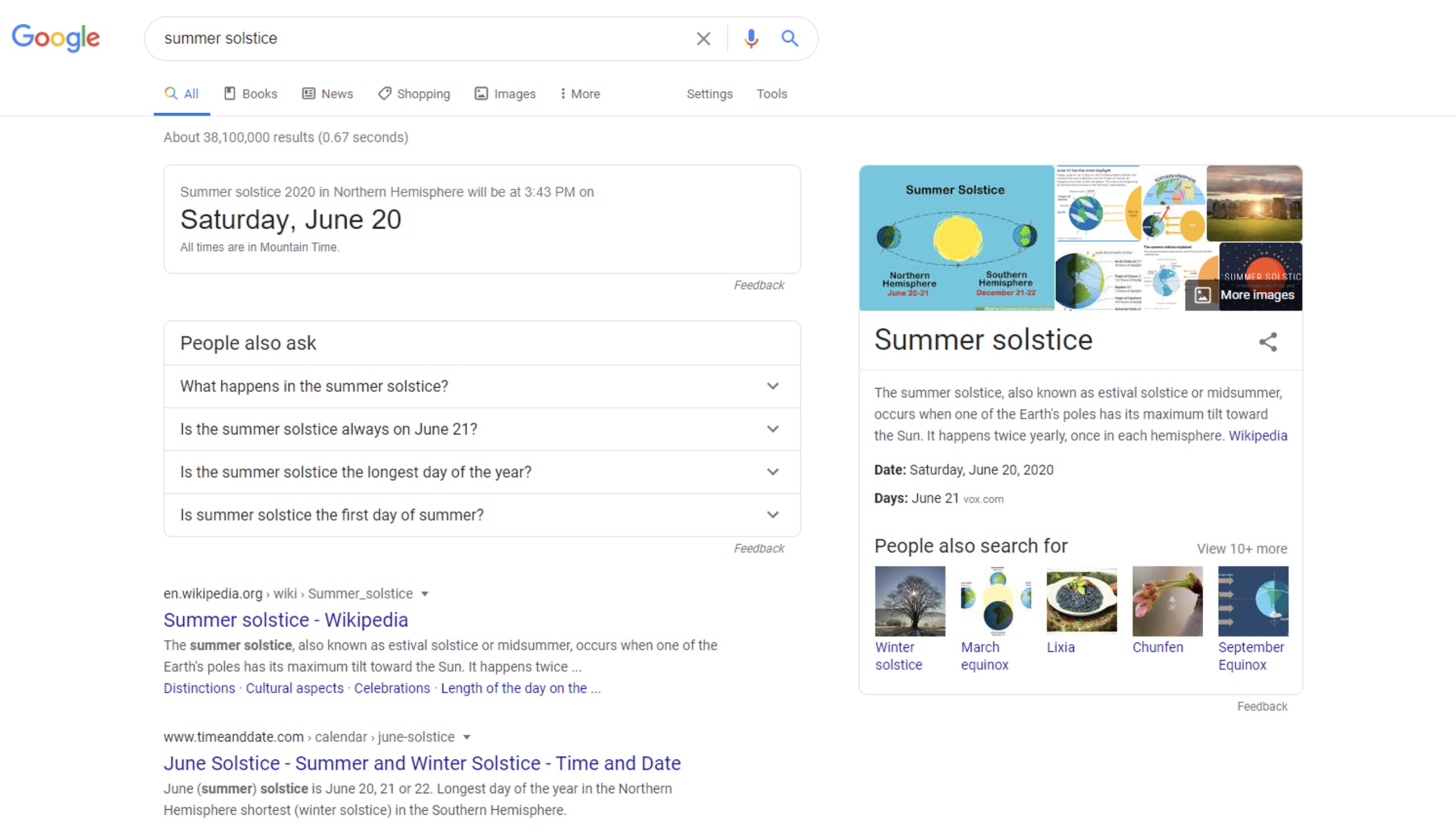
SEO Strategies for Winning Zero-Click Searches
1. Optimize Content for Featured Snippets
A featured snippet answers a user’s question instantly. It appears in a box at the top of a SERP on Google. Three of the primary types of content included in featured snippets are paragraphs, lists, and tables. Photos are often featured as well.
If you have content that ranks anywhere on page one of Google for a search term, you have a good chance of stealing position zero and some of the clicks that would otherwise go to the number one organic search result for that term. Occupying the featured snippet position will also help you increase brand awareness for your businesses. Who doesn’t want that?
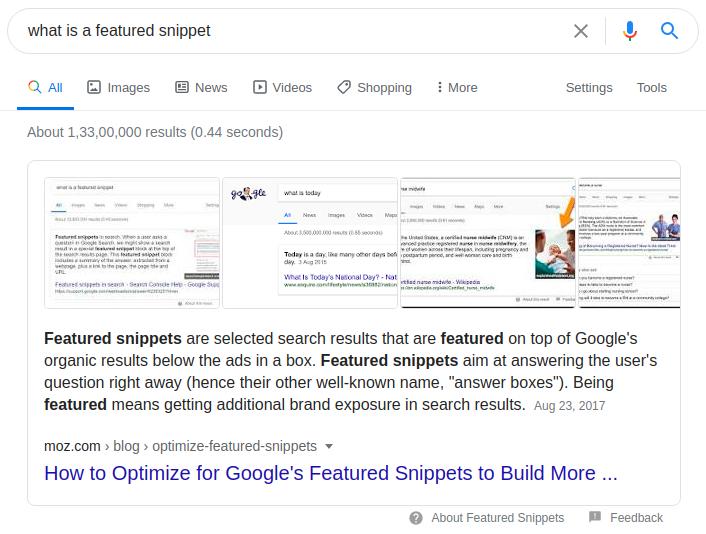
To optimize your content for featured snippets, you need to:
- First, see which target keywords have a featured snippet opportunity by searching for the terms on Google or using a keyword research tool.
- Make sure your on-page website content is optimized for search engines.
- Include the query near the top of your webpage, and then answer it concisely.
- Organize your content using lists, numbers, or steps.
- Create quality, in-depth content that answers related questions throughout your webpage.
- Choose eye-catching images.
- Monitor your content regularly and adjust as needed.
2. Optimize Google-owned Content
Google wants to prioritize its own tools and features above everyone else’s, which is becoming increasingly apparent. Optimizing content on all of your Google-owned properties, like YouTube and Google My Business, will push it to the top of SERPs for zero-click searches more feasible.
Google My Business is an effective way to occupy more space on Google, specifically for branded searches, local searches, and Google Maps results. For optimal results, make sure your profile is complete and fully optimized. A strategic way to lengthen it is by collecting and answering questions about your business and collecting reviews that can be displayed.
To fully optimize your YouTube channel, fill out the “About” section, add some optimally sized channel art, incorporate keywords and metadata, and create playlists.
3. Structured Data is Still Important
Another way to occupy more real estate on Google is by utilizing structured data, AKA schema markup. Structured data is a way to provide additional information about a page to increase credibility and help visitors and search engines better understand what a website is all about.
Marking content can help you rank for featured snippets, show up in the “People Also Ask” section, and display rich data that could lead to higher engagement. Here are some places where it’s smart to incorporate schema markup:
- Recipes
- Movies
- Reviews
- Books
- Events
- Products
- Business information
4. Optimize All Images
Google’s image search offers another opportunity for you to compete for zero-click searches. Using relevant, attention-grabbing images on your website will help you break up content and keep readers engaged. All images should be high quality and sized properly for the web. They should also have relevant file names and descriptive alt text.
5. Structure Content Properly
As you do your keyword and featured snippet research, look at how the content that appears at the top of the SERP is structured. Is it in list form, paragraph form, a graph or chart, or a step-by-step guide? Replicate this structure on your website (using unique content to avoid plagiarizing, of course). Why? Because you already know it works.
We can’t forget the basics when it comes to optimizing our website pages, either. Header tags, titles, URLs, internal and external links, images, and meta descriptions help increase the likelihood of being featured on Google and found by more users, both for organic search results and zero-click searches. Breaking up text with visual headers and images will also improve user experience and make your content more engaging and easier to digest.
6. Answer Frequently Asked Questions
Another way to win “People Also Ask” real estate is by answering frequently asked questions on your website. Focus on question-based keywords you want to rank for, and then create an FAQ section.
For example, if you’re writing a blog post about how to remodel your bathroom, you could create a section on the page where you list commonly asked questions surrounding the main topic and then answer them. In this case, questions could include, “How do I refinish my bathtub? What’s the best flooring for bathrooms? What’s the best water-conserving toilet?”
7. Craft High-Quality Content
This one’s nothing new to those of us involved in marketing. To rank on page one of Google, and to have a better chance at appearing for zero-click search results, we need quality website content that’s both comprehensive and compelling.
Quality, in-depth content provides the most thorough answers to questions people are asking. It also helps us earn more backlinks and social shares, which show search engines that people are highly engaged. An article that addresses a specific query, answers related questions surrounding the main topic, and is backed by solid research will (almost always) rank higher than a short, brief, sloppily written blog post. Remember, to have a shot at grabbing position zero, you have to first show up on page one.
Moving Forward with Online Marketing
The online marketing landscape is constantly evolving. It can be frustrating at times but don’t be discouraged. Many of the same core principles remain constant, like creating the best user experience you can for your customers, providing relevant, quality content people are seeking, and building trust, credibility, and authority, both online and offline.
Just like before this shift in search results occurred, you should continue communicating with authority and confidence online, positioning yourself as an expert in your field. By implementing the tips in this article, you can continue gaining more exposure online, building your brand name, and attracting prospects seeking solutions you’re well equipped to provide.
Need help with keyword research, SEO, content writing optimization, rank tracking, or schema generation? Contact the top SEO service companies!





